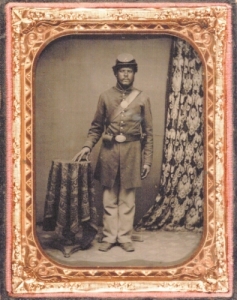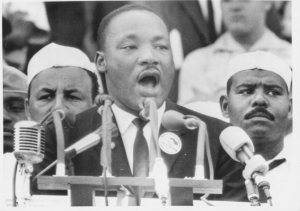History to visit Wayne County
By Phyllis Moore
Published in News on December 29, 2017 5:50 AM

Submitted photo
A photograph from the Gilder Lehrman Institute of an unidentified black private, Company I, 54th Massachusetts Infantry, circa 1863. It is part of the exhibition that will be on display at Wayne Country Day School next month.

Submitted photo
A replica of the photo of the Rev. Dr. Martin Luther King Jr. delivering his address at the Lincoln Memorial during the civil rights march on Washington in 1963.
Wayne Country Day School has been chosen as a site for a national traveling exhibit on slavery and emancipation next month.
"Emancipation and Its Legacies" was developed by the Gilder Lehrman Institute of American History in partnership with the National Underground Railroad Freedom Center. It is slated to be at WCDS from Jan. 17 through Feb. 14.
Joseph Cook, the school's U.S. history teacher, said he plans to take advantage of the teachable moment -- for his students as well as the community.
"This just fits perfectly into everything that I try to teach in my class and for the community, I think it's just a way to remind ourselves that we have come a long way in this country," he said.
The topic is a timely one, he said, and lends itself to some healthy discussion, for both those who lived through some of the civil rights era as well as those unfamiliar with the history.
The Emancipation Proclamation of January 1863, which declared slaves in several Confederate states to be free, affected not only the nation but the Constitution. The 13th, 14th and 15th amendments were a result of the responses to President Abraham Lincoln's proclamation.
The end of slavery in this country just may be one of the most important turning points in the nation's constitutional, political and social history, Cook said.
"For African-Americans, poor whites and women, the South was transformed forever by the Civil War and its aftermath, even if future fights would be needed to complete this transformation," he said. "Dr. (Martin Luther) King reminded the nation of what President Lincoln had said a century before -- that we still had not fully accomplished our 'new birth of freedom.'"
In addition to what Lincoln had set in motion, Cook cited such other players as Thaddeus Stevens and Frederick Douglass during Reconstruction, Booker T. Washington and Susan B. Anthony at the turn of the century, as well as the 54th Massachusetts, Buffalo Soldiers and Tuskegee Airmen, leading up to Dr. King's famous speech in 1963.
"Emancipation and reconstruction began a revolution, but some revolutions take ages for completion," Cook said. "Reconstruction expert Eric Foner wrote, 'Nearly a century elapsed before the nation again attempted to come to terms with the implications of emancipation ... In many ways it has yet to do so.'
"We will be examining many of the ways that the country has attempted to live up to the legacy of emancipation."
The exhibition consists of four interlocking panels that feature historical documents and research done by leading scholars.
The display is divided into categories -- Conflicting Visions of the Future of the United States (1850-1860); War and Fugitive Slaves (1861-1862); Emancipation (1863); The Process of Emancipation (1864-1865); and the Legacy of Emancipation: Civil War to Civil Rights (1865-1964).
Cook's enthusiasm for the project dates back to his own experience as a student at Gettysburg College. He worked as a researcher during his undergraduate and graduate years, including a stint with his college's organization, the Civil War Institute.
In his fourth year as a teacher at WCDS, when he learned about the affiliate school program through the Gilder Lehrman Institute, he immediately signed up.
"One of the things they offer is these traveling exhibitions," he explained.
The theme is also particularly appropriate, as it reflects the "overarching theme" in his class as well as what is taking place in this country, he said, particularly the portion of the Declaration of Independence that says "all men are created equal."
"This is not an exhibit for just one group," he said. "It's a story of America in general, how we have accomplished what our founding fathers set out to do.
"It can be tied into all sorts of movements for different groups of people."
Efforts are being made to incorporate a variety of events around the upcoming exhibit, Cook said, with dates and specifics expected to be announced soon.
Some ideas that are being discussed include a "history versus Hollywood movie night" to compare how accurately movies have portrayed that era in history, a discussion with a Civil War expert from Gettysburg College, as well as a display of student artwork.
